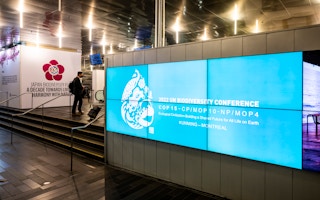The International Sustainability Standards Board (ISSB), which in October voted to make Scope 3 reporting mandatory, has announced a minimum one-year temporary exemption to give companies more time to implement emissions reporting processes.
To continue reading, subscribe to Eco‑Business.
There's something for everyone. We offer a range of subscription plans.
- Access our stories and receive our Insights Weekly newsletter with the free EB Member plan.
- Unlock unlimited access to our content and archive with EB Circle.
- Publish your content with EB Premium.
The exemption is part of a series of guidance and reliefs designed to support companies in disclosing their emissions and will begin follwoing the effective date of its Climate-related Disclosures Standard (S2), the ISSB said. The effective date has not been set, but the standards body is expected to issue its final standard in early 2023.
In a statement following their December meeting, the ISSB said that the measurement of Scope 3 greenhouse gas emissions will “require the use of reasonable and supportable information that is available without undue cost or effort and incorporates the use of estimation”. Scope 3 emissions includes financed and supply chain emissions, covering indirect emissions related to goods and services that a reporting company produces or uses.
“A company’s use of this framework would be accompanied by disclosures to enable investors to understand the basis for measurement of Scope 3 emissions,” the ISSB said.
Companies will also be allowed to include information that is not aligned with their reporting period if the information is obtained from companies in its value chain with different reporting cycles, it added.
“We recognise that companies need help, as best practice continues to develop, in measuring Scope 3 greenhouse gas emissions. The ISSB believes the reliefs and guidance agreed this week will provide companies with the time to get their processes in place, and the guidance to support this disclosure,” said Sue Lloyd, vice-chair of the ISSB.
Meanwhile, in disclosing Scope 2 greenhouse gas emissions that relate to energy purchased or acquired, companies are required to use the location-based method, which reflects the average emissions intensity of its local grid. This should be accompanied by relevant information about contractual instruments in relation to managing the energy it has purchased, the ISSB said.
The standards board also agreed to confirm and refine the proposed requirements for financed emissions, intended to support the disclosure of emissions associated with financial sector portfolios.
“The board approved amended financed emissions disclosures for activities associated with three industries – asset management and custody activities, commercial banks, and insurance,” it said.
Biodiversity standards are next
The ISSB’s latest meeting coincided with the COP15 biodiversity conference in Montreal, where it agreed to consult on priorities beyond its current two initial standards focused on sustainability-related financial information and climate-related disclosures respectively.
“Based on feedback from investors and other market participants, the ISSB agreed to propose four projects for prioritisation in its upcoming consultation on agenda priorities: biodiversity, ecosystems, and ecosystem services; human capital; human rights; and connectivity in reporting with the International Accounting Standards Board (IASB),” the ISSB said.
At COP15, ISSB chair Emmanuel Faber said the board would look into biodiversity rules after publishing its climate disclosure standards.
“Investors here at COP15, and through our ongoing engagement, have set out why they need better insights into biodiversity and ecosystem services that our global economy relies on, such as air and water purification, the provision of raw materials, and pest and flood control,” he said.
He announced the appointment of two special advisors to provide strategic counsel on issues related to natural ecosystems and just transition to the ISSB. These are Karin Kemper, who was until recently the World Bank global director for environment, natural resources and blue economy, and Geordie Hungerford, chief executive officer of the First Nations Financial Management Board in Canada.
In addition to the climate and biodiversity-related discussions at COP15, the ISSB also firmed up the definition of sustainability for its General Sustainability-related Disclosures Standard (S1).
Sustainability will be described in the standard as “the ability for a company to sustainably maintain resources and relationships with and manage its dependencies and impacts within its whole business ecosystem over the short, medium, and long term”.
“Sustainability is a condition for a company to access over time the resources and relationships needed (such as financial, human, and natural), ensuring their proper preservation, development, and regeneration, to achieve its goals,” the ISSB said.








